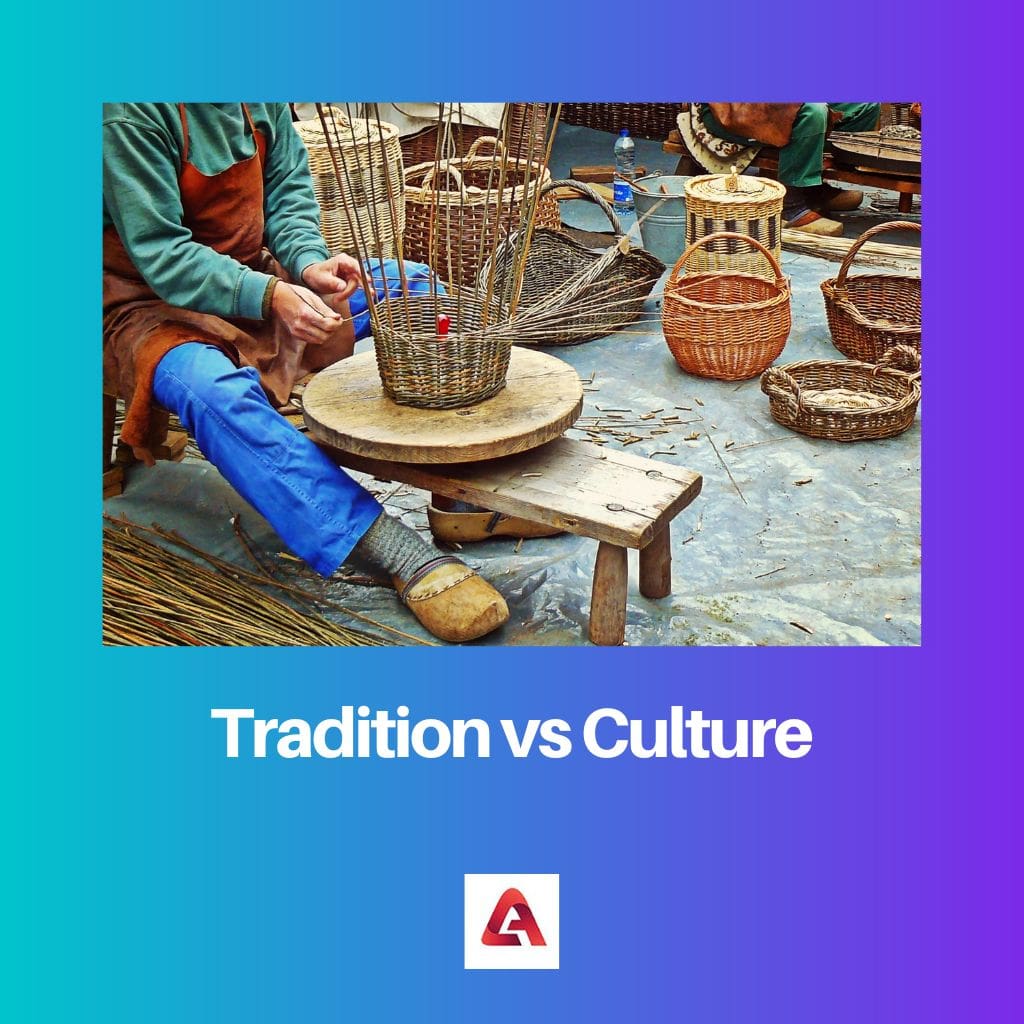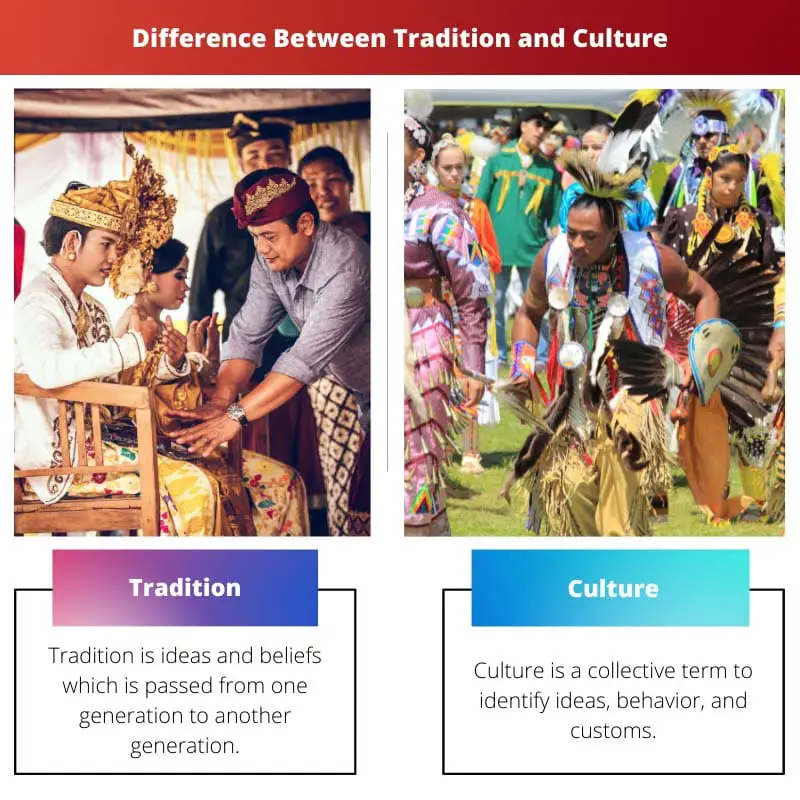Tradition, as well as Culture, is misinterpreted by every human being. Many people don’t know the clear meaning of Tradition and Culture with their particular and highly important differences.
Key Takeaways
- Tradition refers to customs, beliefs, and practices passed down through generations within a particular group or society.
- Culture is a broader concept encompassing the values, norms, beliefs, customs, arts, and practices shared by a specific group, shaping their way of life.
- Although both terms relate to shared practices and beliefs, culture is a more comprehensive concept that includes traditions as one of its many components.
Tradition vs. Culture
Tradition refers to specific practices or rituals that are carried out by a community. Culture encompasses a broader range of beliefs, values, customs, arts, and practices that shape a community’s way of life and worldview, as they provide a sense of continuity and belonging.

Culture is just like a guideline that humans learn while socializing. Culture teaches a person how to dress, talk, walk, behave, and stand out in society and the criteria of being a respected individual.
Whereas; Tradition is a folk custom passed down by particular folks concerned with past origins.
Comparison Table
| Parameter of Comparison | Tradition | Culture |
|---|---|---|
| By definition | Tradition is ideas and beliefs passed from one generation to another. | Culture is a collective term to identify ideas, behavior, and customs. |
| Observation | Traditions are unique from one family to another. | Culture is observed among a group of people. |
| Sum Total | Tradition is a part of the culture. | Culture is a total of traditions. |
| Creation | Tradition is created by individuals. | Culture is created by society or a group of people over a long time interval. |
| Audience | Ancestors, families, and forefathers. | Teenagers, religious communities, and societies. |
| Time Interval | Tradition is a permanent belief carried on for thousands of years. | Culture is flexible with time; we can change and adapt as we wish. |
| Example | Passing property and valuable treasury from grandparents to the new generation from time to time is a symbol of traditional values. | In India, removing shoes and sandals before entering any religious place symbolizes cultural values. |
What is Tradition?
Tradition is a safe giving of treasure through statements, property, values, beliefs, etc., from generation to generation through oral expression or practice.
Tradition, in short, is a treasure gifted by our forefathers or ancestors. Usually, Tradition is seen as a belief or behavior shared within a group or society.
The main motive of tradition is to preserve the past origin and spread its importance and keep behavior and beliefs immortal.
The word tradition is derived from the Latin word- tradere, a synonym for transmitting or handover or giving it for keeping it safe. Tradition helps one to form the structure of the foundation of our societies or families.
The word came into existence through Roman Law, referring to legal transfers and inheritance. Later on, it outshined keeping basic roots as passing from one to another.
National holidays and national anthems are also considered a part of the tradition. Even the small gesture of saying thank you is considered a tradition if passed out from one to another.
In short, whatever beliefs, ideas, etc., are passed from one to another is known as tradition. Tradition, in simpler words, is not sticking to the past but also valuing and treasuring it throughout the lifetime.
An example of Tradition is as follows:
- Thanksgiving in Christmas
- Property
- Mother’s engagement ring

What is Culture?
Culture is qualitative values in a person or society that arise from how, what, and when a person behaves or believes.
The word culture is treasured from the Latin Cultura, which represents cultivation. Culture comprises human artificial intelligence, manifestations, and creative way of living.
Culture is vast in exploring, i.e., the Culture of the Country. If we talk about India and its Indian Culture, then it’s a never-ending conversation. India has different cultures in different states.
Culture comprises arts, folk dance, food, languages, festivals, manners, way of presentation, and flavors and procedures.
In other words, Culture is a bundle or a full package deal of every single belief of tradition combined altogether from birth to the death of humankind.
An example of Culture is as follows:
- Norms: informal or unwritten rules.
- Festivals: Diwali, easter Sunday, Raksha Bandhan, Holi, Navratri, etc.
- Languages: English, Hindi, Spanish, Gujarati, Marathi, French, German, etc
- Holidays: Religious Holidays etc.
- Food: Italian food, Indian food, etc
- Architectures: Different architectures worldwide, like the Taj Mahal from India, the Eiffel Tower from Paris, etc.

Main Differences Between Tradition and Culture
- Tradition is a treasure of life, and culture is a way of living a life.
- Tradition is a part of culture, whereas culture is a sum of traditions.
- Tradition is made out of past origins, whereas culture is a choice to change as per a sophisticated way of life.
- We can adapt and change the culture through our choices, whereas tradition can’t change that easily.
- Tradition is belief, and culture is a collection of beliefs.

The post’s detailed elucidation of the origins and significance of tradition and culture is both valuable and profound.
A commendable, intellectual exposition that enhances one’s understanding of tradition and culture.
I found the breakdown of Tradition vs. Culture very informative and enlightening.
Absolutely, this information offers a comprehensive perspective on tradition and culture.
The post manages to eloquently articulate the nuances of tradition and culture, which is truly impressive.
The article’s content upholds a high standard of intellectual discourse regarding tradition and culture.
Agreed, the post demonstrates an exceptional level of understanding and insight into these complex topics.
This article has successfully expanded my understanding of tradition and culture with its well-presented information.
I appreciated the detailed examples provided, which emphasizes the practical implications of both tradition and culture.
Indeed, the use of real-world examples makes the content relatable and engaging.
The informative nature of the post is truly commendable, offering a comprehensive view of tradition and culture.
I appreciate the deep analysis about both terms, which helps clarify their individual meanings and differences.
I agree, the post provides a thorough understanding of tradition and culture.
This is a well-researched explanation, making it easier for people to distinguish between these terms.
This enlightening article identifies the significance of both tradition and culture in a coherent manner.
Absolutely, the post assists in broadening one’s knowledge about these essential aspects of society.
I appreciate how it illustrates the importance of tradition and culture in society.
The clear comparison table presents a detailed differentiation of tradition and culture, allowing for better comprehension.
It’s impressive how the post breaks down complex concepts into easily understandable points.
The article’s explanations are in-depth and educational, providing a deeper insight into the concept of tradition and culture.
Indeed, the article’s content is intellectually rich and thought-provoking.
The detailed comparison between tradition and culture is both enlightening and enriching, contributing to a better understanding of these concepts.
I’m impressed by the detailed explanations and valuable insights provided in the article.
Absolutely, the post effectively highlights the differences between tradition and culture, making it easier to comprehend.